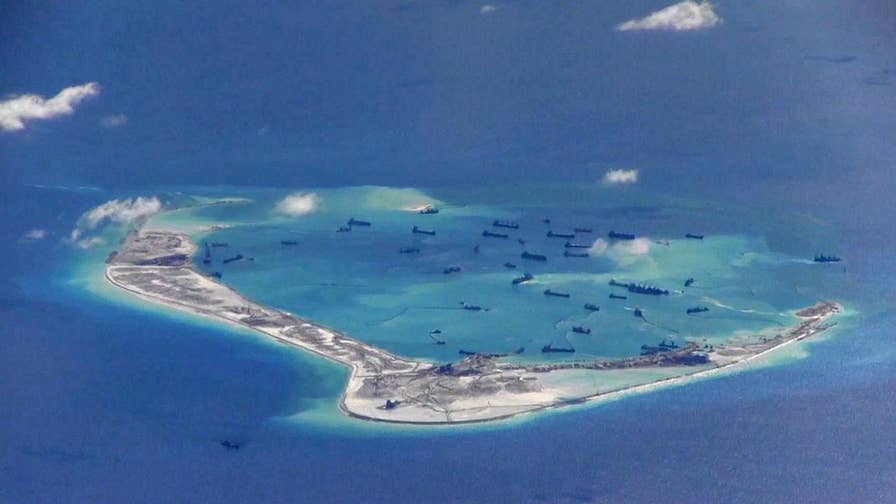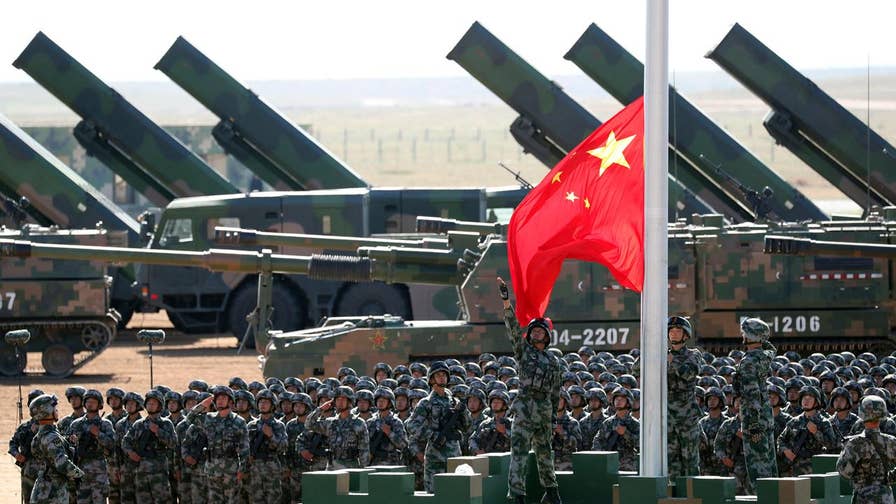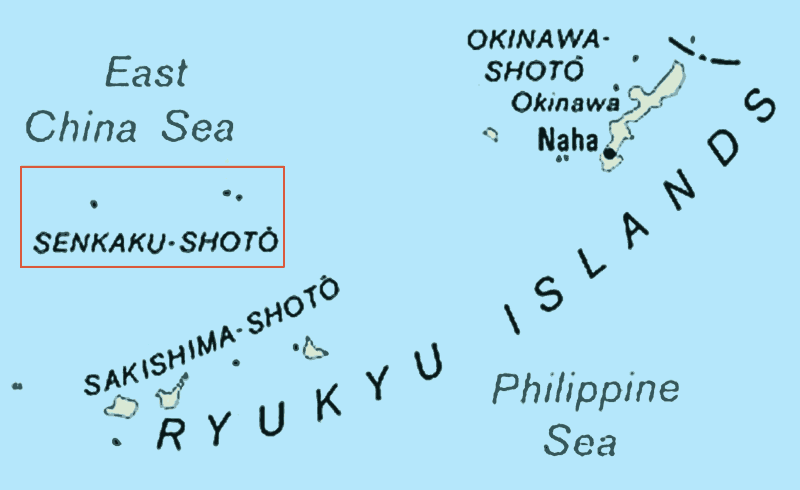Hong Kong soccer fans boo Chinese anthem
By Clare Jim, James Pomfret
Soccer fans hold signs in support of anti-government protesters at a football World Cup qualifier match between Hong Kong and Iran, at Hong Kong Stadium, China September 10, 2019.
HONG KONG -- Anti-government protests that have roiled Hong Kong for more than three months spread to the sports field on Tuesday, as many local fans defied Chinese law to boo the country’s national anthem ahead of a soccer World Cup qualifier against Iran.
The latest sign of unrest in the former British colony followed another weekend of sometimes violent clashes, in which police firing tear gas engaged in cat-and-mouse skirmishes with protesters who at times smashed windows and started fires in the streets.
Earlier on Tuesday, the city’s Beijing-backed leader, Carrie Lam, warned against foreign interference in Hong Kong’s affairs, adding that an escalation of violence could not solve social issues in the Asian financial hub.
Hong Kong returned to Chinese rule in 1997 under a “one country, two systems” formula that guarantees freedoms not enjoyed on the mainland.
The latest sign of unrest in the former British colony followed another weekend of sometimes violent clashes, in which police firing tear gas engaged in cat-and-mouse skirmishes with protesters who at times smashed windows and started fires in the streets.
Earlier on Tuesday, the city’s Beijing-backed leader, Carrie Lam, warned against foreign interference in Hong Kong’s affairs, adding that an escalation of violence could not solve social issues in the Asian financial hub.
Hong Kong returned to Chinese rule in 1997 under a “one country, two systems” formula that guarantees freedoms not enjoyed on the mainland.
But Beijing is steadily eroding that autonomy.
Weeks of protests over a now withdrawn extradition bill have evolved into a broader backlash against the government and greater calls for democracy.
At Hong Kong’s main stadium on Tuesday night, a sizeable contingent of the crowd of more than 10,000 football fans jeered and held up “boo” signs as China’s anthem played before the game, while others chanted “Revolution of our time” and “Liberate Hong Kong”.
Weeks of protests over a now withdrawn extradition bill have evolved into a broader backlash against the government and greater calls for democracy.
At Hong Kong’s main stadium on Tuesday night, a sizeable contingent of the crowd of more than 10,000 football fans jeered and held up “boo” signs as China’s anthem played before the game, while others chanted “Revolution of our time” and “Liberate Hong Kong”.
Disrespecting the national anthem is an offence in China.
Other fans sang “Glory to Hong Kong,” a song that has become a rallying cry for more democratic freedoms in the semi-autonomous Chinese territory.
“We hope we can unite Hong Kong,” said one of those booing, Ah Wing, wearing a red Hong Kong team shirt and glasses.
Other fans sang “Glory to Hong Kong,” a song that has become a rallying cry for more democratic freedoms in the semi-autonomous Chinese territory.
“We hope we can unite Hong Kong,” said one of those booing, Ah Wing, wearing a red Hong Kong team shirt and glasses.
“Even if we lose, we’ll keep going. That’s what we do against strong teams, against strong enemies.”
During a rally at the U.S. consulate on Sunday, thousands of demonstrators, some waving the American flag, called for help in bringing democracy to Hong Kong.
The protesters urged the U.S. Congress to pass proposed legislation that would require Washington to make an annual assessment of whether Hong Kong is sufficiently autonomous from mainland China to retain special U.S. trade and economic benefits.
A bipartisan group of senior U.S. senators stepped up the pressure on Tuesday by writing to the U.S. State and Commerce Departments asking them to assess U.S. export rules for Hong Kong and expressing concern about China’s potential acquisition of sensitive U.S. technologies via the special treatment Hong Kong is allowed.
The lawmakers also expressed concern about whether current export control laws allowed U.S. persons to “inappropriately” export police equipment to Hong Kong that could be used to suppress dissent.
During a rally at the U.S. consulate on Sunday, thousands of demonstrators, some waving the American flag, called for help in bringing democracy to Hong Kong.
The protesters urged the U.S. Congress to pass proposed legislation that would require Washington to make an annual assessment of whether Hong Kong is sufficiently autonomous from mainland China to retain special U.S. trade and economic benefits.
A bipartisan group of senior U.S. senators stepped up the pressure on Tuesday by writing to the U.S. State and Commerce Departments asking them to assess U.S. export rules for Hong Kong and expressing concern about China’s potential acquisition of sensitive U.S. technologies via the special treatment Hong Kong is allowed.
The lawmakers also expressed concern about whether current export control laws allowed U.S. persons to “inappropriately” export police equipment to Hong Kong that could be used to suppress dissent.
The sometimes violent demonstrations have taken a toll on Hong Kong’s economy, which is on the verge of its first recession in a decade.
Hong Kong visitor arrivals plunged nearly 40% in August from a year earlier.
Fitch downgrading
Stephen Schwarz, head of sovereign ratings for the Asia-Pacific region at Fitch Ratings, said the agency’s downgrade of Hong Kong last week reflected damage to the city’s reputation as a place to do business.
“The downgrade reflects months of ongoing conflict environment which are testing the ‘one country, two systems’ framework and which have inflicted damage to the international perception of the quality and effectiveness of Hong Kong’s governance and rule of law as well as the stability of its business environment,” Schwarz said.
China expressed rage on Tuesday after German Foreign Minister Heiko Maas met prominent Hong Kong activist Joshua Wong.
On Monday, former U.S. Defense Secretary Jim Mattis said the anti-government protests were not an internal Chinese matter and the United States should offer at least moral support to the demonstrators.
Lam last week withdrew the controversial extradition bill that had triggered the unrest, but the gesture failed to appease demonstrators.
Anger over the now-shelved bill has rekindled opposition to Beijing that had waned after 2014, when authorities faced down 79 days of pro-democracy protests in the city’s central business district.
Lam called for dialogue on Tuesday.
The protests, beamed live to the world since June, have also prompted some of the city’s powerful tycoons to appeal for calm.
In his first speech mentioning the unrest, billionaire Li Ka-shing urged political leaders to offer young people an olive branch, calling them “masters of our future”, according to an online video of remarks to a small crowd during a monastery visit on Sunday.
“The downgrade reflects months of ongoing conflict environment which are testing the ‘one country, two systems’ framework and which have inflicted damage to the international perception of the quality and effectiveness of Hong Kong’s governance and rule of law as well as the stability of its business environment,” Schwarz said.
China expressed rage on Tuesday after German Foreign Minister Heiko Maas met prominent Hong Kong activist Joshua Wong.
On Monday, former U.S. Defense Secretary Jim Mattis said the anti-government protests were not an internal Chinese matter and the United States should offer at least moral support to the demonstrators.
Lam last week withdrew the controversial extradition bill that had triggered the unrest, but the gesture failed to appease demonstrators.
Anger over the now-shelved bill has rekindled opposition to Beijing that had waned after 2014, when authorities faced down 79 days of pro-democracy protests in the city’s central business district.
Lam called for dialogue on Tuesday.
The protests, beamed live to the world since June, have also prompted some of the city’s powerful tycoons to appeal for calm.
In his first speech mentioning the unrest, billionaire Li Ka-shing urged political leaders to offer young people an olive branch, calling them “masters of our future”, according to an online video of remarks to a small crowd during a monastery visit on Sunday.


/cdn.vox-cdn.com/uploads/chorus_image/image/62719257/1024819516.jpg.0.jpg)










